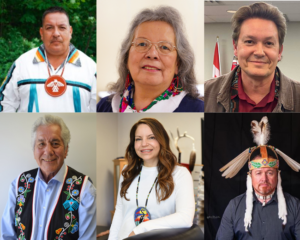Chiefs Council on the Economy advances economic sovereignty at latest meeting

By Anishinabek Nation Economic Development Department
VAUGHAN— The latest Anishinabek Nation Chiefs Council on the Economy (CCOE) meeting brought together key leadership from representative First Nations to discuss ongoing initiatives, challenges, and strategic priorities in Vaughan, Ont., which falls within the Anishinabek Nation Southeast Region, on March 12.
Attended by Chiefs from Alderville, Chippewas of the Thames, and Mississaugas of Scugog Island, along with Deputy Grand Council Chief Chris Plain and Southeast Regional Chief Marsha Smoke and representatives from the Anishinabek Nation, the session highlighted major projects in energy, land acquisition, and development, banking, tourism, and procurement.
Elder Leroy Dolson of Munsee Delaware Nation opened the meeting in a good way by providing an opening prayer, while Deputy Grand Council Chief and CCOE Chair Chris Plain welcomed the members, while Economic Development Department Manager Darlene Solomon set the stage for the discussions.
Alderville First Nation Chief Taynar Simpson shared updates on energy and sustainability like developing partnerships in the nuclear sector and advancing battery storage projects and exploring manufacturing opportunities to support energy initiatives; economic diversification; food sovereignty and eco-tourism; and industrial and retail development. Currently, a feasibility study is underway for an industrial park, and the community has a strong entrepreneurial spirit, with 15-20 cannabis shops and multiple gas stations in operation.
Chippewas of the Thames First Nation Chief Joe Miskokomon, who also serves as the Southwest Regional Chief for the Anishinabek Nation, updated participants on the developments within his community, which included land and treaty issues such as addressing claims by neighbouring First Nation entities and pushing back on external claims within their treaty territory; land claims and membership like examining liability issues in settlement distributions and considering redefinitions of membership; economic empowerment; and education and training. The community is currently exploring financial opportunities, including multimillion-dollar equity stake ventures and a potential bond issuance through the Anishinabek Nation.
Mississaugas of Scugog Island First Nation Chief Kelly LaRocca, special guest to the CCOE, shared updates on land expansion, muddled by the Additions to Reserve (ATR) process; exploring providing water and wastewater services to community members; energy development like engaging in clean energy and fuel supply projects, with participation in LT1 and LT2 battery bids; and procurement and regional collaboration. Currently, the community is pushing for Indigenous procurement policies among regional governments.
The Anishinabek Nation Economic Development Department team members shared project updates on the gas and tobacco sector, including advocating for a portion of the Municipal Gas Tax Fund and reviewing POS and rebate systems to improve participation and compliance; cannabis industry like strengthening self-governance models and business supports, and addressing governance issues related to Certificates of Possession; and tourism development, which includes creating a Regional Tourism Strategy and integrating efforts with Indigenous Tourism Ontario (ITO). The team also shared an update on the energy strategy in coordination with the proposed Energy Task Force and Chiefs Council on Energy, and hosting an Energy Summit in Summer 2025.
The Economic Development Department members also gave updates and next steps on procurement and Indigenous business development, which includes launching a pilot project on supplier switching and administrative change management; establishing formalized purchasing protocols for First Nations governments and organizations; organizing a Procurement Fair (Q3 2025) to connect Indigenous businesses with government and corporate buyers; and strengthening the Anishinabek Nation Business Directory in collaboration with the Chiefs of Ontario. Other updates were provided on the status of the recently launched Economic Blueprint; the planned Business Advisory Council that looks to improve communication between leadership, EDOs, and businesses; and enhancing outreach through newsletters and social media.
With respect to regulatory and legal frameworks, the team is monitoring developments in Indigenous Ministerial Arrangements Regulations (IMARs) under the Canadian Energy Regulator Act, and investigating legal cases affecting pipeline and energy projects on First Nations land.
The Anishinabek Nation Economic Development Department will continue to advocate for a better environment for First Nation businesses, advance comprehensive regional strategies, and explore ambitious opportunities like Anishinabek Nation bond issues and investment strategies.
These initiatives reinforce the Anishinabek Nation’s commitment to economic sovereignty, self-sufficiency, and sustainable growth. Moving forward, collaboration between leadership, EDOs, and community businesses will be key to advancing these priorities, and we encourage widespread involvement across our member Nations.


